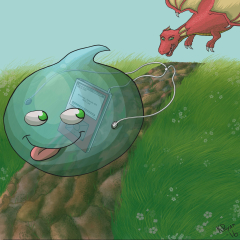This Media Briefing covers the latest in media trends for Digiday+ members and is distributed over email every Thursday at 10 a.m. ET. More from the series →
This week’s Media Briefing covers publishers picking up on Meta’s evolving message about AI content licensing deals.
Publishers are picking up new vibes from Meta, which they believe signal that the platform may be changing its stance on AI licensing.
So far, it’s more rhetoric than reality. Nevertheless, if it were to come to fruition, it could reset the dynamic between Meta and publishers, many of whom still feel burned by years of declining referral traffic from the platform.
When publishers, retailers and cloud edge companies gathered at the IAB Tech Lab’s first workshop in New York City on 23 July, to discuss first steps in creating a standardized framework for AI content monetization and attribution, Meta and Google were also present.
Four publishers Digiday spoke to said that during the event, Meta’s message was that there is now more buy-in at the senior level within the company regarding the value of potentially forging closer ties with publishers of quality content.
“[They] were clear that the new leadership knows that AI runs on good content, and that has moved Meta to engage more,” said a publishing exec of a major media brand who attended the event and agreed to speak under the condition of anonymity.
Of all the platforms, Meta has the fewest AI licensing deals, having partnered with Reuters last year to use its content to answer user questions in real time about news and current events.
Meta has radically reorganized its AI operations under a new division called Meta Superintelligence Labs, consolidating all its AI teams — from foundational model development to product engineering — under one roof.
“Meta was very clear that with their new leadership – because they’ve obviously been building a Superintelligence team very quickly, and there’s completely new AI leadership – they were very clear that there’s a different attitude to accessing information going forward than what they had before,” said the same publishing exec. “Although it turns into a whole different question. They were very clear that their stance on this has changed, even though it may not have outwardly turned into action yet.”
Meta declined to comment for this article.
No road map is currently in the works and nothing formative has been established at Meta. No publishers are under any illusion about the fact that Meta is in the information-gathering phase. “My takeaway was that they are now approaching things differently and expanding how they source their information beyond their platform,” said another exec who attended the meeting.
Earlier this year, Raptive signed a contract with its creators and publishers, which means it can now handle AI licensing negotiations on their behalf. Since then, it has received an inquiry from Meta around the potential AI licensing of one of its publishers on the platform, though without any firm commitment, according to Raptive chief strategy officer Paul Bannister. “They weren’t, like, ready to do a deal. They were like, we’re just trying to figure out the lay of the land here and see what to do. So it does seem like they are trying to figure it out,” he said.
With no concrete details from Meta on what its Superintelligence unit will actually deliver, or what its appetite for AI licensing deals will really be, speculation is the only game in town for now.
But various industry execs Digiday spoke to believe that in order to compete with AI rivals OpenAI, Google and Anthropic it needs to have its own access to new quality content – the type premium publishers have in spades. Even Amazon has acknowledged its need to closely pair with publishers, having recently signed AI licensing deals with the New York Times, Conde Nast and Hearst.
Despite what Google claims, publishers believe they can’t fully block its AI crawler without jeopardizing their search rankings, whereas there is no such catch with their blocking Meta’s crawler. And a quick glance at the robots.txt files of publishers including The Guardian, Washington Post, Financial Times, New York Times and News UK – publisher of the Times of London and tabloid The Sun – shows they’re all blocking the main Meta Llama crawler.
“Nearly no one is blocking Google from scraping their content, because if you block Google, you lose all the search traffic, so no one does it,” said Bannister. “OpenAI has negotiated a large number of deals with people [publishers] so even though a bunch of people are blocking them [OpenAI], they have access to a large swathe of high quality content, and everybody else, I think, is getting blocked pretty heavily these days, including Meta, because publishers have no incentive to let Meta scrape their content,” he added.
And when it comes to the AI race, neither Google nor Meta can afford to remain static. And Meta has some catching up to do, stressed several industry execs Digiday spoke to.
“The frontier models understand that in order to be truly useful, they need a model to get fresh news and data,” said a publishing exec under condition of anonymity.





